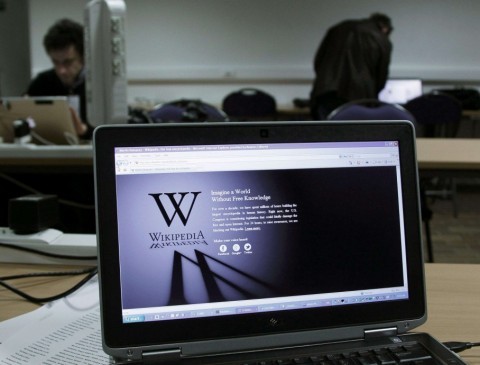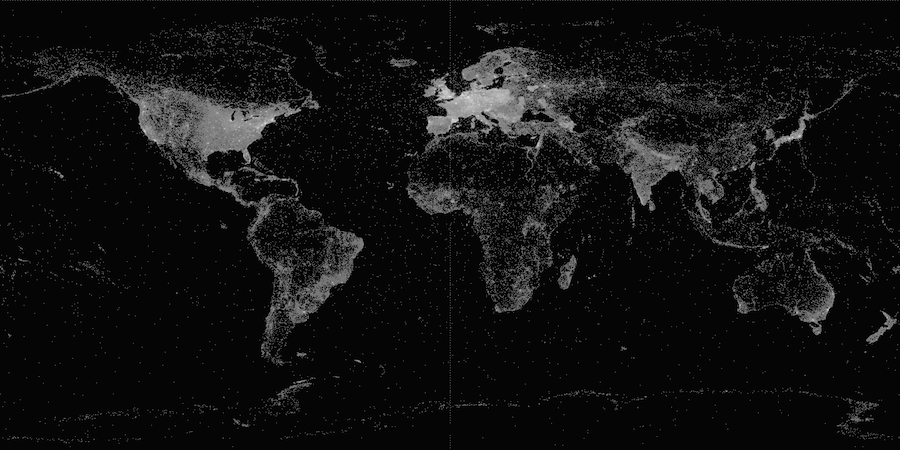The New York Times reports that the Library of Congress has begun posting recordings from its Archive of Recorded Poetry and Literature in honor of National Poetry Month.
50 of the collection’s nearly 2,000 audio recordings are now available online, and another will be added each month as the program continues. This initial sample includes a 1971 lecture by Kurt Vonnegut; Robert Frost’s interview with Randall Jarrell; readings byElizabeth Bishop, Galway Kinnell, Rita Dove, William Meredith, Gwendolyn Brooks, Paul Muldoon, and many others; Ray Bradbury’s excellent lecture, “Beyond 1984: What To Do When The Doom Doesn’t Arriveâ€; audio from the Academy of American Poets 35th anniversary program in 1969, and more. Start listening here.Â
Category Archives: Did you Know?
The story behind the longest-running hoax in Wikipedia history
Jar’Edo Wens is an Australian aboriginal deity, the god of “physical might†and “earthly knowledge.†He’s been name-dropped in books. Carved into rocks.
And, as of March,conclusively debunked.
There is no such figure, it turns out, in aboriginal mythology; instead, Jar’Edo Wens was a blatant prank, a bald invention, dropped into Wikipedia nine years ago by some unknown and anonymous Australian. By the time editors found Jar’Edo Wens, he had leaked off Wikipedia and onto the wider Internet.
He had also broken every other Wikipedia hoaxing record. At nine years, nine months and three long days, Jar’Edo Wens is the longest-lived hoax found on the free encyclopedia yet.Â
The story behind Jar’Edo Wens, the longest-running hoax in Wikipedia history – The Washington Post.
Where does Wikipedia’s information come from?
Wikipedia helps us make sense of the world. In 277 languages from Ukrainian to Urdu, its 36 million articles deepen our understanding of the people, places and ideas that matter to us. While it can feel like a static resource, Wikipedia’s articles are born and nurtured through a thoroughly human process. Behind the scenes, thousands of Wikipedians craft policy that guides decisions about whether an article reflects a neutral point of view, a source should be considered reliable, or a subject is notable enough to warrant an article.
[…]
Geographic differences underlie many differences in editor perspectives. Each editor lives in a particular place in the world, reads specific languages, and represents some national culture. These geographic differences translate to differences between language Wikipedias…
[…]
Our research studies where information in Wikipedia comes from, a characteristic we call geoprovenance. We focus on the four million Wikipedia articles about places that, along with information such as TripAdvisor reviews and geotagged flickr images, constitutes the rising class of information renowned geographer Michael Goodchild calls volunteered geographic information (VGI)
The 2015 IMPAC Shortlist Delivers 10 Eclectic Titles
The IMPAC Award shortlist was announced today. The IMPAC sets itself apart with its unique approach. Its massive longlist is compiled by libraries all over the world before being whittled down by judges. This makes for a more egalitarian selection. It’s also got a long lead time. Several books up for the current prize (to be named in June) were initially published as far back as 2013, putting the IMPAC more than a year behind other big literary awards. There’s a distinct upside in this. By now, nearly all the shortlisted books are available in paperback in the U.S.
The IMPAC also tends to be interesting for the breadth of books it considers, and the 2015 shortlist is no exception, with seven countries represented, though only three of the books are translated works. Four of the ten shortlisters are by women.
- Americanah by Chimamanda Ngozi Adichie
- Horses of God by Mahi Binebine
- Harvest by Jim Crace
- The Narrow Road to the Deep North by Richard Flanagan
- Burial Rites by Hannah Kent
- K by Bernardo Kucinski
- Brief Loves that Live Forever by Andreï Makine
- TransAtlantic by Colum McCann
- Someone by Alice McDermottÂ
- Sparta by Roxana Robinson
The Millions : The 2015 IMPAC Shortlist Delivers 10 Eclectic Titles.
European Union Literature Prize Winners Announced
The latest winners of the European Prizes for Literature, each worth €5,000, were announced at London Book Fair yesterday.
The winners are:
- Carolina Schutti (Austria);
- Luka Bekavac (Croatia);
- Gaëlle Josse (France);
- Edina Szvoren (Hungary);
- Donal Ryan (Ireland);
- Lorenzo Amurri (Italy);
- Undine Radzeviciute (Lithuania);
- Ida Hegazi Høyer (Norway);
- Magdalena Parys (Poland);
- David Machado (Portugal);
- Svetlana Žuchová (Slovakia);
- Sara Stridsberg (Sweden).
Tibor Navracsics, European Commissioner for Education, Culture, Youth and Sport, said: “This is the only book award dedicated to the best up-and-coming authors from all over Europe, regardless of their country of origin or language. With this prize and our continued support for translations of literary works, we are helping literature cross borders and enabling readers to enjoy the wealth of writing talent we have. This is crucial: literature opens the mind, allowing us to come closer together and understand each other better, which is now more vital than ever.â€
via Publishers Weekly (London Book Fair coverage)


